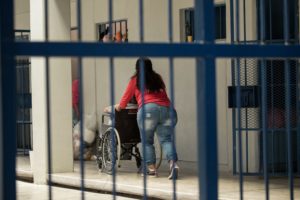By: Joy Olson, Executive Director of WOLA
The proposal to receive various Guantanamo detainees who have been cleared for release has become the central issue in Uruguay’s electoral race. While some of the questions that are emerging in the public debate are valid and deserve to be answered, what is really happening is the politicization of an issue that deserves to be treated as a humanitarian issue, an issue of human rights.
The darkest stain on U.S. human rights history in recent decades is the Guantanamo Bay detention facility. Hundreds of individuals have been held there since 2002, almost all of them without trial, under a dubious American interpretation of the laws of war. The “war” in question is the war on terror, which seems to have no end.
The United States has created a humanitarian and legal mess out of which it can’t seem to find its way. Debate surrounding the facility and its closure has dragged on for so long that it has fallen from the national consciousness.
Before President Obama was elected in 2008, he pledged to close Guantanamo. But it didn’t happen in the first term. In the second term he renewed that commitment, but Congress has made closing the facility increasingly difficult. As this political standoff plays out year after year in Washington, the 149 prisoners still held at Guantanamo are left in limbo.
While some were certainly involved in acts of war or terror, individuals were brought to Guantanamo for many reasons—including that the U.S. paid bounties for turning people in, a technique that often nets more than those intended.
About half of those currently detained have been “cleared for release,” meaning that every conceivable part of the U.S. government has been asked if there is any reason to view these people as a threat to the United States. For these 79 individuals, the answer has been no, but they are still being held captive.
Congress has passed laws that will not allow them to be released into the United States. Most of this group cannot go home because of the risks they face in their homelands. Without a plausible return home or to the U.S., these 79 are left with nowhere to go.
But for every problem, there is a solution—even limbo. This one will need uncommon political courage and help from leaders outside of the United States who are committed to human rights and willing to bear potential political costs at home because they have the capacity to resolve a serious human rights issue.
It will always be politically controversial for any nation to resettle Guantanamo prisoners authorized for release. How unfortunate that those prisoners who could have a new life in Uruguay now remain captives of a partisan electoral debate.
If Uruguay receives these Guantanamo detainees, the nation must use this act as what it is, a demonstration that Uruguay is a leader on human rights issues. Those of us who work on behalf of human rights on the continent will owe a debt of gratitude with those who, through this resettlement, help to put an end to the human rights catastrophe that is Guantanamo.
—
Joy Olson is a leading expert on human rights and American policy toward Latin America. Under the direction of Ms. Olson, WOLA has pioneered the development of new strategies for advocacy around human rights, focusing on the primary causes of injustice, inequality, and violence in the region. Under her leadership, the Washington Post has recognized WOLA as one of the best non-profit organizations in Washington. WOLA was founded in 1974 to promote human rights and social justice in Latin America and U.S. foreign policy toward the region.
Image courtesy of Wikimedia Commons

